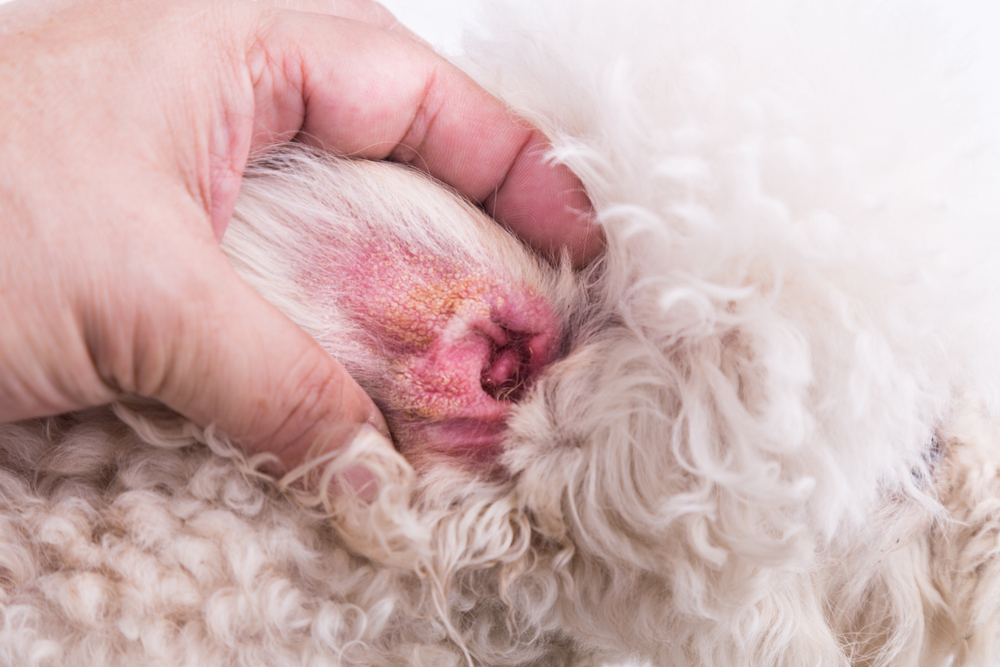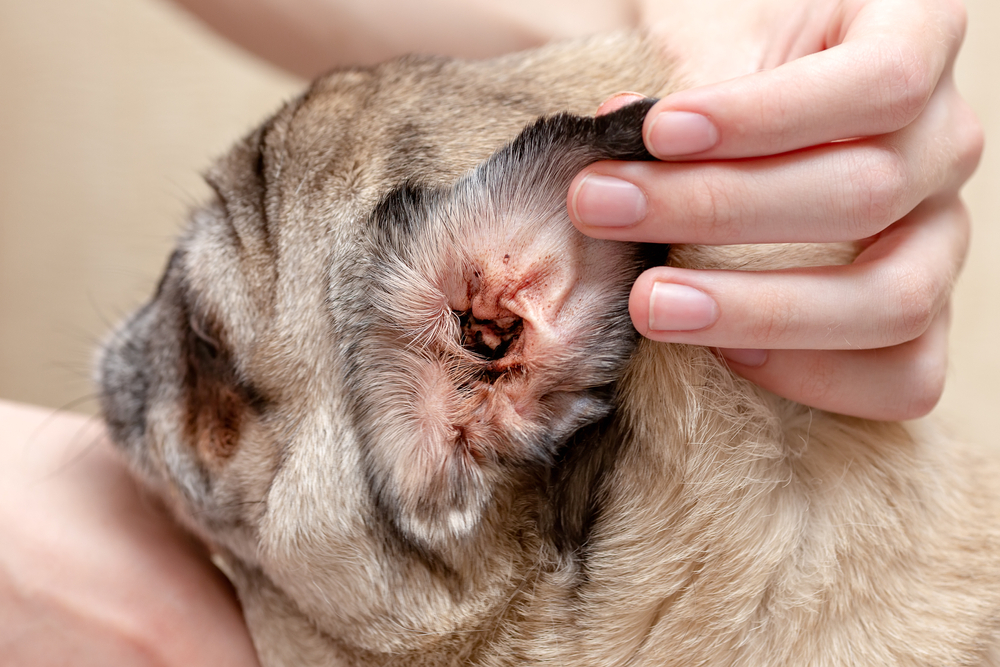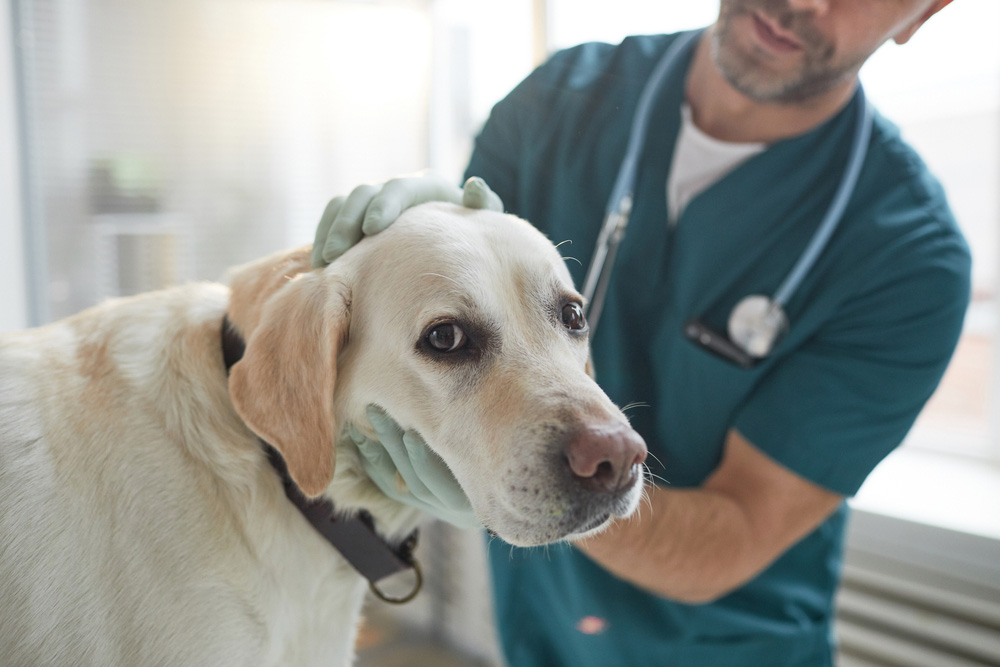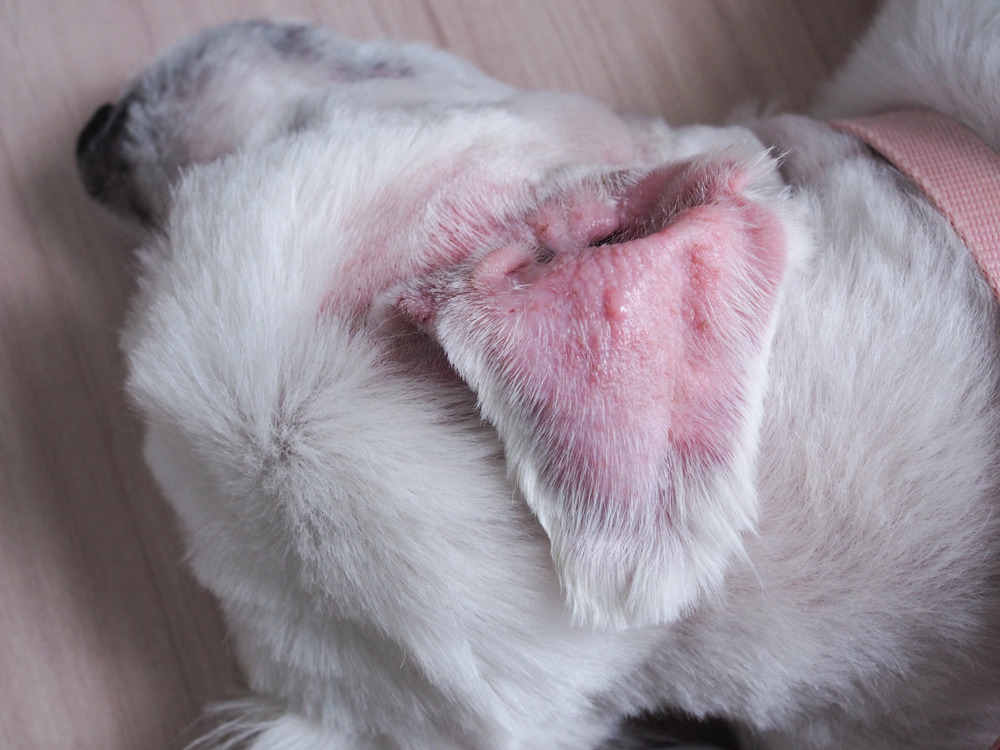If you notice your dog holding their head strangely or digging a paw into the side of their face, it could be because their ears are bothering them. When you investigate, you may find that your dog’s ears are swollen, among other signs. But what could be causing this uncomfortable condition? Here are six possible reasons that can cause your dog’s ear to swell.

The 6 Causes of Dog Ear Swelling
1. Ear Hematoma
If the flap of your dog’s ear (pinnae) is swollen, they could be suffering from an ear hematoma. Hematomas occur when a blood vessel bursts in the dog’s ear, usually because the pup has been shaking their head excessively.
The blood fills the space between the skin and cartilage, essentially forming a fluid blister. Fixing an ear hematoma involves correcting the problem and treating the underlying reason the dog was shaking their head in the first place. See your veterinarian if you suspect your dog has an ear hematoma.

2. Ear Infection
Ear infections can also cause your dog’s ear to swell due to inflammation. The ear canal or ear flap can swell if your dog suffers from an infection. Ear infections are generally caused by yeast or bacteria. Dogs with floppy ears or narrow ear canals are more prone to ear infections. They’re also common among dogs who spend a lot of time in the water. Besides ear swelling, you may notice discharge, redness, a foul odor, and your dog shaking their head or scratching frequently.
A vet will be able to advise you on the best course of action to ensure the well-being of your pet.
If you need to speak with a vet but can't get to one, head over to PangoVet. It's our online service where you can talk to a vet online and get the advice you need for your dog — all at an affordable price!
3. Allergies
Chronic allergies or an allergic reaction could cause your dog’s ears to swell. Dogs with food or seasonal allergies live with so much itching in their bodies that it may lead to secondary issues like ear infections.
Bee stings or insect bites can lead to an allergic reaction that causes your dog’s ears to swell. Like humans, dogs can suffer severe allergic reactions or anaphylaxis. It’s best to take your dog to a veterinarian if you suspect an allergic reaction; their vitals will be checked and treatment may include an antihistamine or fluids.

4. Foreign Body
If your dog gets foreign material stuck in their ear, it could cause swelling and pain. You may notice your dog constantly holding their head to the side, shaking their head, or pawing at their ears if they have a foreign body stuck inside. Your vet will need to investigate your dog’s ears and possibly perform more specialized tests to determine if foreign material is present.
5. Ear Mites
Ear mites are microscopic parasites that feed on the wax in your pup’s ears. They’re more common in cats but can occur in dogs, too. Ear mite infestations can cause discharge and swelling in your dog’s ears.
You may also notice hair loss from your dog scratching their itchy ears. They can get ear mites from contact with another infected pet. Ear mite infections are diagnosed by looking at a swab of the discharge under a microscope.

6. Mass
Your dog’s ear could swell due to a mass growing on or inside of it. Masses can grow slowly or quickly. Not every mass is cancerous, either, and cancers can be benign or malignant. As part of your dog’s regular grooming routine, you should be performing a quick check for any new growths or swelling, including in their ears.
The earlier you can catch any masses, the faster they can be removed. Your vet may take a sample of the ear mass to determine whether it’s cancer before suggesting a treatment plan.

What to Do If Your Dog’s Ear Is Swollen
As you can see, there are multiple possible causes of ear swelling in dogs, and you’ll need to see a veterinarian to diagnose the issue properly. Although ear swelling is generally not an emergency, many ear conditions can be painful for your dog.
In addition, if the ear swelling is the result of an allergic reaction, more serious signs could present themselves. Left untreated, external ear infections can result in middle or inner ear infections.
Your veterinarian will examine your dog’s ears and take samples to examine under a microscope. If your dog has an ear hematoma, a minor surgical procedure may be necessary to correct the problem. Other causes of ear swelling may be treated by cleaning and medications.
It’s essential to follow all your vet’s instructions as you deal with the cause of your dog’s ear swelling.


Conclusion
Ear swelling and other ear issues are some of the most common medical problems dogs experience. While they typically aren’t life-threatening, ear issues can make your dog miserable and you miserable, too. If your dog constantly suffers from ear problems, you can talk to your veterinarian about a possible referral to a veterinary dermatologist for help.
Featured Image Credit: Kittina05, Shutterstock






















2 Responses
My dog has two lumps that have been checked by my vet and he said they were not life threatening and she should be fine. They haven’t grown and she doesn’t seem to be bothered by them. My concern is she recently got a similar soft lump on her ear. I don’t have the funds to take her to the vet, so wondering if it might go away or if it will be there always like her other two lumps?
Hello Jennifer,
thank you for your question and sorry for a bit of a delay. We are sorry to hear about your dog's skin issues. Lumps like these always require visual examination, however, if you can't visit a veterinarian, there are some alternatives.
You can book a video call appointment with one of our veterinarians from www.PangoVet.com. They will take a look at the lumps and let you know whether you need to be concerned or not. You can even upload photos before the meeting and 20 minute call currently costs just $29.95.
Hope this helps.